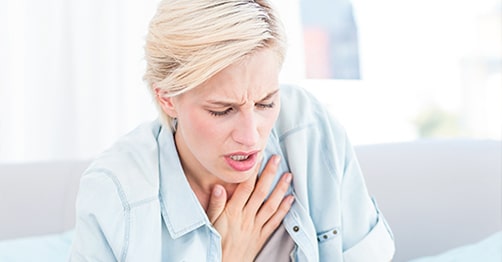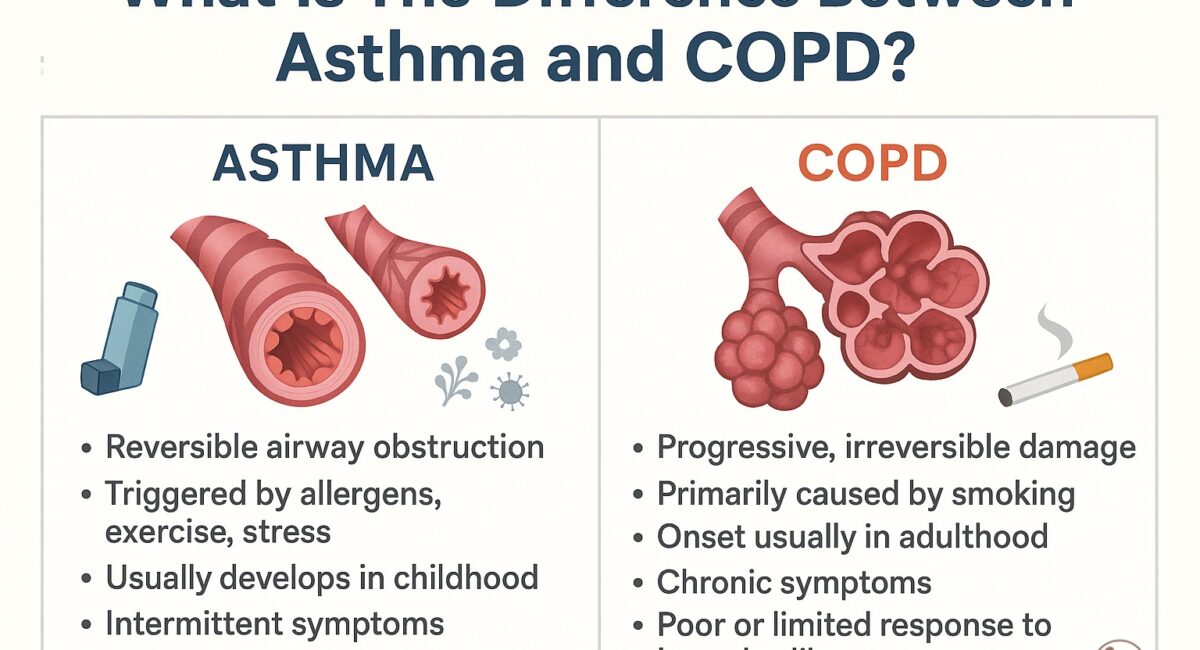Are you coughing more than usual, feeling short of breath, and finding your inhaler isn’t as effective? If so, you might be wondering: are these symptoms of asthma, or could it be COPD?
At first glance, asthma and COPD appear to be nearly identical. Both cause wheezing, coughing, and chest tightness.
But here’s the surprising part: they behave very differently inside your lungs, they get triggered by different causes, and they even affect your daily life in entirely different ways.
In this blog, you’ll uncover the hidden signs that separate asthma from COPD and what you should do if you encounter any symptoms.
Get Asthma Treatment At Fam Urgent Care
Table of Contents
ToggleKey Differences Between Asthma and COPD

Asthma is usually triggered by allergens like pollen, mould, or even exercise, causing sudden flare-ups that can ease once the trigger is gone.
COPD, on the other hand, is a long-term lung disease that includes emphysema (when the tiny air sacs in your lungs are damaged) and chronic bronchitis (your airways stay swollen and clogged with mucus).
The main difference is that asthma symptoms often come and go, giving you stretches of normal breathing, while COPD symptoms gradually worsen over time and rarely let up.
Symptoms: Asthma vs COPD
| Asthma | COPD |
|---|---|
| Wheezing at night or in the morning | Chronic mucus-producing cough |
| Shortness of breath during triggers | Ongoing shortness of breath |
| Chest tightness (feels like pressure) | Fatigue / low energy |
| Cough occurs during triggers | Persistent and productive cough |
| Symptoms come and go | Symptoms may worsen over time |
| Triggers: allergens, exercise, dust, mould, stress | Triggers: smoking, long-term air pollution, workplace fumes |
Causes: Asthma vs COPD
| Asthma | COPD |
|---|---|
| Allergies due to mites and pollen | Long-term smoking |
| Environmental triggers (pollution, strong odours, fumes) | Long-term exposure to air pollutants |
| Respiratory infections | Chemical fumes |
| Genetics | Coal dust |
| Physical activity, exposure to cold air, or stress can trigger attacks | Secondhand smoke |
| Asthma history | |
| Frequent respiratory infections in childhood |
How Do They Affect Daily Life?
Living with asthma or COPD may shape your daily life in very different ways.
For people with asthma, most days can feel normal. But when triggers like pollen, cold air, or exercise strike, sudden flare-ups may cause coughing, wheezing, and fatigue that interrupt work, sleep, or social plans. The unpredictability is often the most challenging.
COPD, however, places a heavier burden. Because symptoms are constant and progressive, even simple activities like carrying groceries, climbing stairs, or walking short distances can become exhausting over time.
Unlike asthma, there are no long breaks of “normal breathing,” which makes COPD far more limiting to everyday routines.
Can Asthma Turn Into COPD?
No, asthma cannot simply turn into COPD; they are different diseases with different causes.
Asthma is often related to allergies and inflammation, while COPD is mostly caused by long-term exposure to irritants like cigarette smoke.
However, both conditions can occur together, known as Asthma-COPD Overlap (ACO), where a person experiences symptoms of both asthma and COPD.
If someone has asthma for a long time and it is poorly managed, then the constant swelling in their lungs can cause permanent damage; this condition can feel like COPD.
You can protect your lungs by following these steps, such as visiting your provider regularly and taking medications.
Treatment for Asthma and COPD
Although asthma and COPD may look alike, the way doctors treat them is very different.
COPD treatment focuses on slowing down the disease and managing symptoms, while asthma treatment aims to control flare-ups and prevent attacks.
Treatment for COPD
COPD cannot be cured, but the right treatment can slow its progression and improve quality of life. The main options include:
- Bronchodilator inhalers
- Inhaled corticosteroids
- Pulmonary rehabilitation
- Oxygen therapy
- Medications for flare-ups
- Lifestyle changes
Treatment for Asthma
Asthma treatment focuses on controlling symptoms and preventing attacks. This often includes:
- Quick-relief inhalers (bronchodilators)
- Daily control inhalers (corticosteroids or combination inhalers)
- Allergy medications or shots
- Nebulizer treatments
- Avoiding triggers
Can Urgent Care Help with COPD or Asthma?
Yes. Urgent care is often the right place for asthma or COPD flare-ups that are uncomfortable but not life-threatening. You should consider visiting urgent care if you experience:
- Increased coughing or wheezing that doesn’t settle with your usual inhaler
- Shortness of breath that makes daily tasks (like walking or climbing stairs) harder than usual
- Chest tightness that isn’t improving with regular medication
- Need for a nebulizer treatment or a refill of your inhaler/prescriptions
- A cold, flu, or respiratory infection that is making your breathing worse
Urgent care providers can provide quick relief through inhaler or nebulizer treatments, prescribe medications, and help prevent your symptoms from worsening.
Conclusion
All in all, the main difference between asthma and COPD is how they behave over time.
Asthma symptoms often come and go and can usually be controlled with the right treatment, while COPD symptoms tend to be constant and gradually worsen.
Knowing which condition you’re dealing with helps you take the right steps.
If you’re unsure about your symptoms, visiting Family Urgent Care can give you answers and relief so you can breathe easier.
You can book your appointment or walk into any of the nearest locations in Indiana or Illinois.


